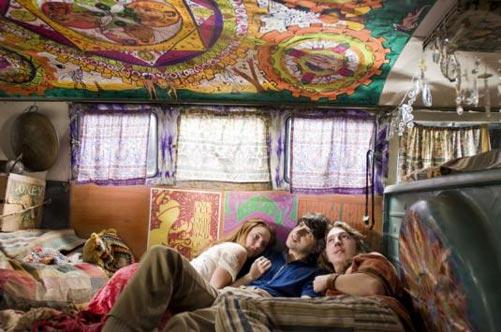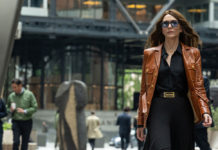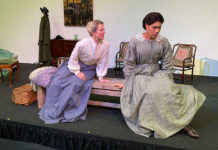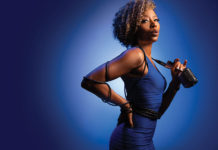Ang Lee is a superb director who can deftly show the tragedy of
suburban families (“The Ice Storm”), the comedy of a gay New York
man who tries to hide his sexuality from his traditional Taiwanese
family by staging a marriage of convenience to a young woman (“The
Wedding Banquet”), the sublime beauty of male and female Chinese
warriors fighting in the air above a forest of bamboo (“Crouching
Tiger, Hidden Dragon”), the amazing transformation of a
mild-mannered scientist to a massively muscled green giant (“The
Hulk”), and the deeply felt love between two cowboys (“Brokeback
Mountain”). So it is not unreasonable for us to expect that Ang
Lee’s film about what really happened at Woodstock 40 years ago
would be something incredibly special.
Unfortunately, it’s not.
There are a few basic problems. The first is that there are two
or more movies here. One is the tale of a not very interesting
interior designer named Elliot Tiber (played by the not very
interesting actor, Demitri Martin), who leaves Greenwich Village
each summer to move back with his parents and help them run their
dilapidated motel in upstate New York. The other movie is a PG-13,
behind the scenes look at the happening which was (or at least
purports to have been), Woodstock. Parts of this section,
especially the “how did this all happen” aspect of securing the
locations, providing all the logistics and then coping with the
unbelievable number of pilgrims who descended on this sleepy
community, are superb. But other parts feel like they are
set-pieces, created by the scriptwriters to make sure everything
that we think happened that August weekend in 1969 gets a cameo
appearance.
For example, when Elliot finally decides to actually see part of
the concert going on at his neighbor Max Yasgur’s (Eugene Levy)
farm, he is hailed and embraced by most of the iconic figures we
have come to identify with the event—the Afro-haired concert
promoter on horseback (Jonathan Groff), the wigged-out Vietnam vet
(Emile Hirsch) sliding over and over down a mud-slicked hillside,
the “want-to-get-high-and-have-a-threesome?” California couple
(Paul Dano, Kelli Garner) in the brightly painted VW bus, and the
state trooper (James Hanlon) who came to “bash some hippie heads,”
but was won over by people’s positive vibes. While at the same
time, the other icons pass by in the background (like some long,
convoluted sentence in a not very favorable review), the couple
from the cover of the Woodstock concert album embracing while
wrapped in a bedspread, the ardent feminists burning their bras in
a trash can, the anti-war activists doing the same with their draft
cards, the tie-dyed clothing vendors, the skinny dippers, the
wait-in-line-for-the-porta-potty crowds, the multitudes of casual
drug users, the food booths selling roasted corn on the cob for 15
cents and triangles of watermelon for a quarter, while other booths
prepare and give away free soup, the thousands upon thousands of
pickup trucks, family sedans, station wagons, and vans abandoned on
the shoulder of the highway by people who plan to return after the
roads open again, the masses of humanity, the sense of
wonderfulness and the repeated realization “we’re not in Kansas
anymore.”
As the 40th anniversary drew near, many people were interviewed
about those music, mud, sex and pot-fueled days at a farm in
upstate New York, and it is interesting that one of the most
recognizable couples from the event (the ones clad in the
aforementioned bedspread) weren’t hippies at all, but local
farmer’s kids who heard about a free concert on the radio. They got
married a few months later, will soon celebrate their 40th
anniversary, and work as an elementary school nurse and a county
housing worker.
In short, what you get from Ang Lee’s concertless film about a
concert, is what expectations about Woodstock that you bring into
the theater.
Comments? E-mail gi*********@co*****.net.
67.4
F
Healdsburg
April 18, 2025








